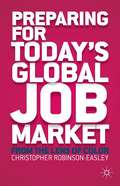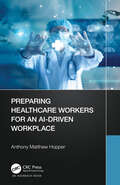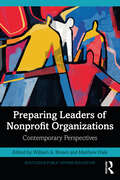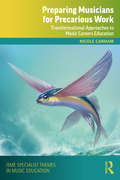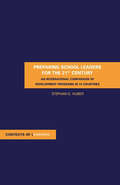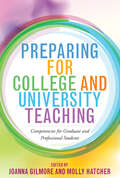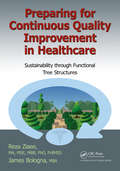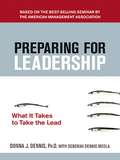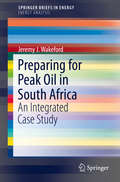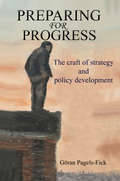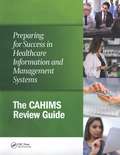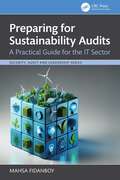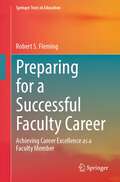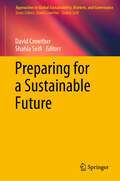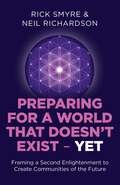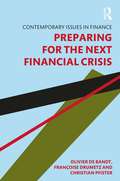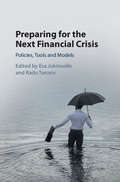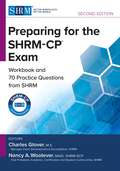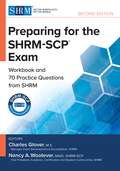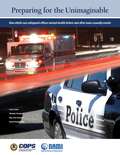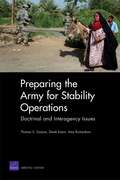- Table View
- List View
Preparing For Today’s Global Job Market
by Christopher Anne Robinson-easleyFrom the Lens of Color identifies and delineates a methodology for effectively positioning and/or repositioning oneself in today's global job market that moves significantly beyond strategies associated with simply developing a resume, cover letter or business plan.
Preparing Healthcare Workers for an AI-Driven Workplace
by Anthony Matthew HopperA large number of healthcare employees, whether they are on the frontlines or in management, work in complex, fluid environments. They must perform a diverse number of sometimes intricate tasks on a daily basis as well as excel in handling ad hoc interactions with patients, residents, coworkers, or other stakeholders. In the coming years, these workers will also have to adjust to disruptions in their workplaces that are brought about by the introduction of new Artificial Intelligence (AI) systems and health information technologies (HITs) into their offices and clinics. Many of these workers will find themselves competing for jobs not only with other humans but also with machines.Preparing Healthcare Workers for an AI-Driven Workplace helps healthcare professionals to develop their core critical thinking skills while also enabling them to develop methodologies for successfully completing complex projects by themselves, dealing with ad hoc interactions, and taking advantage of the coming AI- and IT-driven changes in their workplaces. The book begins with explaining why healthcare workers, whether they work on the frontlines or in management, need to be strong critical thinkers. It breaks down “critical thinking” into its key elements and provides methods that readers can use to help them to master critical thinking and grow to become elite critical thinkers. The book also provides tips on how to handle ad hoc conversations with supervisors, coworkers, patients, residents, and other stakeholders. Examining how AI- and IT-related developments will transform the healthcare ecosystem in the coming years, the book identifies key mindsets and strategies for thriving in technologically rich healthcare environments.
Preparing Leaders of Nonprofit Organizations: Contemporary Perspectives (Routledge Public Affairs Education)
by William A. BrownThere are more than 1.8 million nonprofits in the United States and at least 3 times that many internationally. Workers in these nonprofits and civil society organizations increasingly look to academic programs to provide leadership and management training. This edited volume is designed to provide new and experienced faculty and program administrators with a broader conception of how the nonprofit leaders of the future are and could be educated. The chapters are written by experienced nonprofit program leaders who provide guidance on all aspects of building and more importantly maintaining a successful nonprofit program. Many of the chapters are written by former leaders of the nonprofit Academic Centers Council (NACC), a recognized international leader in nonprofit management curricular development, while others are written by successful founders and administrators of nonprofit programs both in the US and internationally. All chapters are however grounded in the experience of the authors, supplemented with research on best practices and focusing on future trends in the field.Preparing Leaders of nonprofit Organizations examines key issues and challenges in the fi eld from multiple perspectives, some of which are curricular and intellectual while others are related to program administration and oversight. The text explores core concepts, distils distinctive features of new or emerging academic programs, and identifies ways program leadership might ensure those features are reflected in their programs regardless of where these are housed within a university. The book is an essential resource for faculty and administrators who work with or are seeking to develop a nonprofit education program. It is also a useful guide for graduate students seeking a career in the nonprofit academy.
Preparing Musicians for Precarious Work: Transformational Approaches to Music Careers Education (ISME Series in Music Education)
by Nicole CanhamPreparing Musicians for Precarious Work: Transformational Approaches to Music Careers Education promotes career counselling-informed techniques that encourage and guide musicians to drive their careers in necessary new directions. In exposing the ‘dark side’ of precarious work in the arts sector, these approaches acknowledge the high levels of risk many musicians face and focus on the fundamental and urgent skills they need to navigate uncertainty and hardship. The author calls for a greater recognition of the psychological magnitude of managing such work, drawing upon training as a career counsellor and the lived experience of a career musician to advance transformative learning principles as pathways for artists, students, and educators alike. Representing a radical shift from the content-knowledge approach to career development, a counselling-informed method is fortified by a broad range of ideas from vocational psychology and narrative therapy, emphasising the importance of change readiness and flexible identities while identifying the need for a post-portfolio paradigm. Preparing Musicians for Precarious Work proposes a new model for musicians’ career learning – the CHOICE model – in a timely and practical guide for 21st-century musicians looking to future-proof their careers.
Preparing School Leaders for the 21st Century (Contexts of Learning)
by Stephan Gerhard HuberThe quality and success of schools depend upon school leadership. Increasingly, in many countries worldwide, this belief has led to designing and implementing appropriate training and development programs for educational leaders. In an international comparative research project, current school leader training and development programs in fiftee
Preparing a Concession Bid at TAV Airports Holding
by Cigdem Celik C. Fritz FoleyIn 2013, TAV Airports Holding prepared a bid for the concession to build and operate the third Istanbul airport. This process involved input from various parts of the firm with operating and financial expertise. Burcu Geri , the CFO of TAV Airports Holding, and her team created a model to evaluate the opportunity and formulate a bid.
Preparing and Using the Statement of Cash Flows
by Robert L. Simons Antonio DavilaExplains the concepts and procedures behind the statement of cash flows. Presents an overview of the reporting objectives of this report, and describes in detail the preparation of the cash flow statement using both the indirect method and the direct method. A complete numerical example is presented. Financial analysis techniques using the cash flow statement are also described. A rewritten version of an earlier note.
Preparing for Career Success 2009
by Jerry Ryan Roberta RyanSelf-understanding is the foundation of a planned career choice.
Preparing for College and University Teaching: Competencies for Graduate and Professional Students
by Joanna Gilmore, Molly HatcherThis book is a guide for designing professional development programs for graduate students. The teaching competencies framework presented here can serve as the intended curriculum for such programs. The book will also be an excellent resource for evaluating programs, and will be an excellent resource for academics who study graduate students.This book presents the work of the Graduate Teaching Competencies Consortium to identify, organize, and clarify the competencies that graduate students need to teach effectively when they join the professoriate. To achieve this goal, the Consortium developed a framework of 10 teaching competencies organized around three overarching questions:• What do graduate students need to achieve by the end of their graduate education to be successful teacher-scholars?• What do graduate students need to understand about higher education to have successful careers as educators?• What do graduate students need to do to be successful teachers during their graduate student careers?Although much work has been done to identify the competencies of effective teachers in higher education, only a small portion of this work has been conducted with graduate student instructors. This is an important area of research given that graduate students are critical in the higher education academic pipeline. Nationally, graduate students teach between 25% and 50% of courses offered at the undergraduate level. Graduate student teaching is also critical because during early teaching experiences teachers establish a teaching style and set of teaching skills, which will endure as graduate students enter the professoriate.It is important to develop a teaching competency framework that is specific to graduate student instructors as they often have unique needs and roles as teachers. For example, graduate student instructors are in the unique position of becoming experts in their field concurrent with learning to teach. Moreover, as many professional development programs for graduate student instructors evolve based upon factors such as available resources and perceived needs of graduate students, this framework will be a useful aid for thoughtfully designing strategic, evidence-based, comprehensive professional development opportunities and programs.
Preparing for Continuous Quality Improvement for Healthcare: Sustainability through Functional Tree Structures
by Reza Ziaee James S. Bologna MBAThis book provides a set of detailed instructions to help you construct your departmental, divisional, or organizational functional tree structure (FTS) and work towards world-class service. Preparing for Continuous Quality Improvement for Healthcare: Sustainability through Functional Tree Structures outlines a method that will enable your organiza
Preparing for Leadership: What It Takes to Take the Lead
by Donna J. Dennis Debbie MeolaWhat makes a great leader? Confidence? Trust? Vision? The ability to inspire? The answer is complex yet understandable. The good news is that most great leaders are made, not born, and many of the characteristics associated with effective leadership can be assessed, trained, and developed. Based on the best-selling seminar by the American Management Association, this book gives readers practical advice on how they can:• get noticed by learning how to look and talk like a leader• become expert teambuilders, coaches, and communicators• gain and use power and influence positively• guard against the pitfalls of intraorganizational politics• identify and build strategic alliances• elicit support• motivate othersContaining practical tools including assessments, tips, and checklists, this book shows readers how to take their organizations into the future, inspire those around them...and achieve beyond what is expected.
Preparing for Peak Oil in South Africa
by Jeremy J. WakefordOil is the lifeblood of modern industrial economies. Petroleum powers virtually all motorized transport, which in turn enables most economic activities and provides mobility for citizens. But oil is a finite resource that is steadily depleting. In the past decade, the phenomenon of global peak oil - the fact that annual world oil production must at some point reach a maximum and then decline - has emerged as one of the twenty-first century's greatest challenges. South Africa imports over two-thirds of its petroleum fuels, and history has shown that oil price shocks generally translate into a weakening currency, rising consumer prices, increasing joblessness and a slow-down in economic activity. This book examines the implications of peak oil for socioeconomic welfare in South Africa and proposes a wide range of strategies and policies for mitigating and adapting to the likely impacts. It contains a wealth of data in tables and figures that illustrate South Africa's oil dependencies and vulnerabilities to oil shocks. The material is presented from a systems perspective and is organized in key thematic areas including energy, transport, agriculture, macro-economy and society. The study highlights the risks, uncertainties and difficult choices South Africa faces if it is to tackle its oil addiction, and thereby serves as an example for researchers, planners and policy-makers in the developing world who will sooner or later confront similar challenges. This case study brings a fresh southern perspective to an issue of global importance, and shows how the era of flattening and then declining global oil supplies may be a pivotal period in which either the project of industrialization progressively runs out of steam, or societies are able to undertake a proactive transition to a more sustainable future.
Preparing for Progress: The craft of strategy and policy development
by Göran Pagels-FickWhether it’s public or private sector, strategic and policy decisions are the nuts and bolts of creating direction and making progress. Such decisions must be clear, tangible and detailed enough to focus, accelerate and smooth out subsequent levels of operational decision-making.This book provides a profound analysis of the qualities which should characterise strategic and policy decision processes. It also explains why these processes sometimes don’t deliver as expected. This enlightening, thought-provoking work will take you beyond process models based on boxes and arrows, and enable you to design workflows centred on creativity and learning.The author illustrates numerous real-life cases, relating processes to outcomes and vice-versa. Using clear, concise language and informative graphs and diagrams, he provides informative yet accessible information for readers from all career paths.Göran Pagels-Fick has been a researcher, a business developer and a private sector strategist. His career has included roles in research policy for a national academy and government innovation agency and as a research policy lobbyist in Brussels. His work has also involved him in foresight programmes across various European and Asian countries.Whatever your field, Preparing for Progress will prove a truly interesting, stimulating and valuable guide.
Preparing for Success in Healthcare Information and Management Systems: The CAHIMS Review Guide (HIMSS Book Series)
by HimssHIMSS’ Certified Associate in Healthcare Information and Management Systems (CAHIMS) certifi cation offers a pathway to careers in health information technology (health IT) for associate-level, emerging professionals, or those who would like to transition to health IT from other industries. The CAHIMS Review Guide is the ideal resource for those preparing for the CAHIMS Certifi cation Exam—or looking for a comprehensive ‘health IT 101’ guide. Content in the CAHIMS Review Guide reflects the CAHIMS exam content outline. Content is divided into three topic categories: organizational and technology environments; systems analysis, design, selection, implementation, support, maintenance, testing, evaluation, privacy and security; and leadership and management support. Each chapter includes learning objectives for tracking progress in understanding and articulating the content. Practice exam questions at the end of the book reinforce key concepts explored throughout the book. The CAHIMS Review Guide also features a glossary of acronyms used throughout the book for easy reference during exam preparation and ‘on the job’ reference after certification.
Preparing for Sustainability Audits: A Practical Guide for the IT Sector (Security, Audit and Leadership Series)
by Mahsa FidanboyThis book is a practical guide to be used by people with little or no knowledge of sustainability as well as sustainability professionals and experts who intend to prepare software companies to undergo sustainability audits and assessments conducted by different organizations, successfully. With sustainability regulations and rules becoming stricter gradually, it will not be long until the mandatory requirements are needed to be fulfilled by IT companies and they will be expected to prepare for annual internal and external audits as they are for many other standard audits.The book begins with explaining the main concepts of sustainability, continuing with presenting recommendations to turn those into practice. Upon completion, it will enable a reader to make an IT company ready for sustainability audits.The first chapter makes the reader familiar with the sustainability dimensions from diverse perspectives. The second chapter explains the characteristics of the IT sector that make it unique in terms of the implementation of sustainability related activities. Subsequently, the challenges and solutions on the way to prepare IT companies for sustainability audits and assessments are brought to attention, together with guiding the readers through this procedure. The third chapter focuses on documentation for sustainability audits, including but not restricted to statements, policies, procedures, and other supplementary documents. Chapter 4 contains the details regarding actions, from the very first stage of planning actions to revising and correcting them. Furthermore, it encompasses instructions on how to identify metrics for the activities planned. The fifth chapter guides the readers on how to measure the progress of actions, followed by discussions on how to analyze the data collected. The final chapter provides information on how to prepare and release sustainability reports.
Preparing for a Successful Faculty Career: Achieving Career Excellence as a Faculty Member (Springer Texts in Education)
by Robert S. FlemingThis book provides valuable information and practical insights regarding preparing for and pursuing a successful faculty career. It offers essential guidance through sequential chapters that consider the various stages of a successful faculty career, including what faculty members need to know with respect to each lesson and the role of each topic in contributing to career success. Each lesson also provides useful career guidance regarding things that faculty members should do as well as avoid doing during each stage of a faculty career. The book is designed to serve as an essential learning tool in related career preparation courses as well as a valuable self-study and reference source for faculty members. The unfortunate reality is that most graduate programs do not provide essential career guidance regarding the roles and responsibilities of becoming and succeeding as a faculty member. The phrase “hidden curriculum” has been used to describe this unfortunate reality. New faculty members often discover that they are expected to know so many essential things once they become a faculty member. The mission of this book is, therefore, to contribute to the success of readers throughout their careers as faculty members and enhance their ability to meet and exceed the expectations of their students, institution, and other stakeholders. The various lessons are designed to enhance faculty success throughout one’s career as well as the meaningfulness and pleasure of one’s faculty career.
Preparing for a Sustainable Future (Approaches to Global Sustainability, Markets, and Governance)
by David Crowther Shahla SeifiThe term sustainability has become one of the most significant in the current era. It seems to be ubiquitous amongst academics, politicians, business leaders, media personnel and even the general public. It is no exaggeration to state that it is considered all over the world to be the most pressing issue to be addressed for the long-term future of the planet and its inhabitants. The topic is of course complex, and the issue of sustainability is under much debate as to what it actually is and how it can be achieved, but it is completely certain that the resources of the planet are fixed in quantity and, once used, cannot be reused except through being reused in one form or another. At present, much of the discourse of sustainability has focused upon the environment and in particular upon climate change and the effects that this is having. Thus, the discourse has tended to be about mitigation.Sustainability of course requires all three pillars of the triple bottom line—economic, environmental and social—to be addressed. Indeed, it might be considered that the effects upon the social, and how we choose to live our lives, might well be the most profound effect of achieving sustainability. This book therefore focuses upon some of the many aspects of the social and how we can adapt our lives to accommodate the requirements of sustainability. it therefore takes a very different approach to addressing the issues of sustainability, while of course not ignoring the other pillars.This book therefore sets out to examine various aspects of the changes to personal, corporate and institutional behaviour which may have to come about in our search for sustainability. It is tended to address some of the issues and how they are being dealt with in various parts of the world. As always, our concept is to share best practice and thereby enrich both the discourse and our progress towards sustainability. Thus, we focus upon the current situation while also considering the extent to which the focus is changing so much that we need to think about new approaches to our understanding of behaviour and differing effects in practice. The international origins of the contributors to this book make this an original contribution taking some of the best ideas from around the world.This book therefore addresses these issues from a perspective not generally addressed by researchers, or even by politicians and the press. It therefore provides fresh perspectives upon the important issue of our common future. As always, this approach is based on the tradition of the Social Responsibility Research Network srrnet.org (a worldwide body of scholars with membership of several thousand), which in its 20-year history has sought to broaden the discourse and to treat all research as inter-related and relevant to business. This tradition has always been to explore the subject widely and to seek relevant solutions, while also sharing best practice. This book is based primarily upon some of the contributions from the network at our recent conference and shows both commonality and diversity in approaches and effects.
Preparing for a World that Doesn't Exist - Yet: Framing a Second Enlightenment to Create Communities of the Future
by Neil Richardson Rick SmyreAre you really ready for change? Are you prepared for a world changing as fast as you can read this sentence? Most leaders say they are prepared for the future, yet many organizations and communities are doing things in the same old way they&’ve been working for decades. We&’re living on the precipice of a new era in human history. Preparing For A World That Doesn&’t Exist - Yet offers an approach to getting ready for an emerging society that will be increasingly fast paced, interconnected, interdependent, and complex. In Preparing For A World That Doesn&’t Exist - Yet, you will learn about an emerging Second Enlightenment and the capacities you&’ll need to achieve success in this new, fast-evolving world. Higher education, health and wellness, governance and the economy are transforming in ways few of us could have imagined ten or even five years ago. In this book, you&’ll get the skills you need to ride the wave of the future and the perspective you&’ll need to be ready to catch the next wave, too. Planners, physicians, government and higher-education leaders are using the principles and capacities described in this book to create better organizations, and best of all communities of the future that will lead to a planet that can thrive. Join them in looking at the future with excitement and anticipation.
Preparing for the Next Financial Crisis (Contemporary Issues in Finance)
by Christian Pfister Olivier de Bandt Francoise DrumetzThe ramifications of the Global Financial Crisis, which erupted in 2007, continue to surprise not only the general public but also finance professionals, economists, and journalists. Faced with this challenge, Preparing for the Next Financial Crisis goes back to basics. The authors ask: what do theory and empirical observations tell us about the causes and the consequences of financial crisis and instability? In what has become an increasingly complex financial world, what lessons can we learn from economic policies, which have been implemented, and research, which has developed extremely rapidly in recent years, so as not to repeat past mistakes?In this comprehensive review of the literature, which is both complete and balanced, the authors highlight the points of consensus among economists and policymakers. They assess the capacity of economic policies and institutions in limiting the cost of financial instability. In conclusion, they ask if the financial system has become safer, in the light especially of the Covid-19 Global Crisis. Ten years after the GFC crisis, this is a timely review of the reform agenda, the progress made, and the areas where further changes need to be made to address new risks and challenges.
Preparing for the Next Financial Crisis: Policies, Tools and Models
by Esa Jokivuolle Radu Tunaru"In the years since the subprime financial crisis of 2007-2011, we have learned a number of important lessons about the crisis, and have subsequently applied appropriate legislation, such as increased capital ratios and systematic stress testing, in order to combat it. However, it would be naive to suggest that such measures have put an end to the possibility of future crises. In this book, senior figures in economics, risk Management, and the banking sector use active research and policy debates to offer a wide perspective on what the next financial crisis may look like and what can be done about it from a regulatory point of view. By first exploring issues of macroeconomic policy, and then studying cutting-edge methodologies, challenging important aspects of testing financial practice, this book will be an essential read for all those studying and researching financial crises, financial regulation and macroprudential policy-making"--
Preparing for the SHRM-CP® Exam: Workbook and Practice Questions from SHRM
by Charles Glover and Nancy A. Woolever, editorsEffective exam prep starts with practicing the real thing. This updated, official SHRM Certification workbook includes 70 practice items from previous SHRM-CP® exams to give candidates firsthand experience with the types of questions they'll face in the real exam. Each item includes feedback about correct responses. It also offers guidance about each item's difficulty level indicators to help learners develop smart study and test-taking strategies plus more emphasis on understanding and utilizing the SHRM Body of Applied Skills and Knowledge® (SHRM BASK®).An essential resource for SHRM-CP® candidates, this workbook bridges knowledge and exam readiness through practical, focused preparation to strengthen both content understanding and test-taking confidence.
Preparing for the SHRM-SCP® Exam: Workbook and Practice Questions from SHRM
by Charles GloverThis updated SHRM Certification workbook delivers exam prep with real questions. Seventy practice items used in past SHRM-SCP® exams are provided to give certification candidates exposure to the types of items they will encounter in the real exam, as well as feedback about correct responses. Also offers guidance about each item’s difficulty level, which can help develop study and test-taking strategies plus more emphasis on utilizing and understanding the SHRM Body of Applied Skills and Knowledge® (SHRM BASK®).
Preparing for the Unimaginable: How Chiefs Can Safeguard Officer Mental Health Before and After Mass Casualty Events
by Laura Usher Stefanie Friedhoff Major Sam Cochran Anand PanayaWhile most government agencies are trained in how to react to a mass casualty event such as a terrorist attack or natural disaster, few are prepared to deal with the psychological fallout for first responders. Preparing for the Unimaginable fills that void. This book is the product of the National Alliance on Mental Illness’s work with the Newtown, Connecticut, police force in efforts to cope with the shooting at Sandy Hook Elementary school that left twenty six people, including twenty children, dead. This unique publication offers expert advice and practical tips for helping officers to heal emotionally, managing the public, dealing with the media, building relationships with other first responder agencies, and much more. Complete with firsthand accounts of chiefs and officers that have guided their departments through mass casualty events, Preparing for the Unimaginable seeks to provide practical, actionable strategies to protect officer mental health before and after traumatic events.
Preparing the Army for Stability Operations
by Derek Eaton Amy Richardson Thomas S. SzaynaMuch activity is being aimed at revising the approach to planning and implementing Stabilization, Security, Transition, and Reconstruction (SSTR) operations. The changes are meant to ensure a common U.S. strategy rather than a collection of individual departmental and agency efforts and on involving all available government assets in the effort. The authors find that some elements essential to the success of the process are not yet in place.
Preparing to Coach: Keep your Eyes, Ears, and Mind Open
by Richard LueckeThis chapter discusses how effective coaching requires some prior planning, and such planning allows you to take full advantage of every learning opportunity. Observation, listening, and meeting the challenge are elemental features of coaching for both the coach and the subordinate and result in more targeted and effective coaching sessions.
